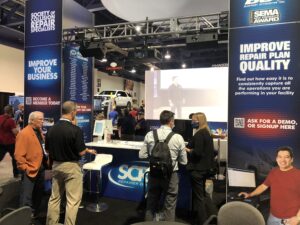
SCRS makes SEMA sessions digitally accessible
By onAnnouncements | Collision Repair | Education
The Society of Collision Repair Specialists (SCRS) has made all of its Repairer Driven Education (RDE) sessions recorded during last year’s Specialty Equipment Market Association (SEMA) show available online.
The 2022 RDE pass provides remote access to more than 20 sessions from the Las Vegas, Nevada event. Some examples include:
-
- Prevailing rates and how to define them
- Untapping potential by understanding your performance
- Profitability gains through labor identification
- Embracing digitalization in your paint shop
- Customer guidance in invoking the appraisal clause
- The importance of wheel alignment in ADAS recalibration for collision centers
The $249 pass gives viewers access to content through August, with current SCRS members entitled to a 20% discount. The videos could be especially valuable to those who couldn’t make the conference, or who had conflicts that prevented them from attending some sessions.
Those who purchase the pass will also have access to three OEM Summit sessions. Topics explored during those presentations include OEM repair procedure accessibility, tackling the technician crisis together, and managing scan tool choices while ensuring safe and proper repairs.
Meanwhile, SCRS has released two new IDEAS Collide videos on YouTube.
In Jeff Peevy’s “A Pattern of Basic Assumptions,” the I-CAR executive encouraged businesses to resist the urge to lean too heavily on assumptions. Instead, he said they should foster a strong workplace culture by challenging their ways of thinking.
“[One thing] I know for sure is that the strongest business cultures have a very strong element in that culture of learning,” Peevy said. “They put their people first. They encourage, in fact, they insist, on learning and they insist on sharing what they know with one another. They insist that it is perfectly okay to challenge these assumptions, to challenge our way of thinking because they mold the way we perceive things.
“As a result of that, these cultures that succeed [and] do really well are willing to challenge their culture and that pattern of learned assumptions. And that is, I would offer with the speed and momentum of change, the key to being able to be successful in a very dynamic, healthy, vibrant culture.”
In the second episode “The Psychology of Money,” Scott Broaddus, who helped implement the 401(k) solutions offered to SCRS members, discussed behavioral economics.
“Given the climate we’ve had this year, anyone who has watched their 401(k) balances, a lot of you are thinking about behavioral economics whether you realize it or not,” he said. “In super technical terms behavioral economics means, ‘Why do I do what I do with my money?’”
Behavioral economics has been studied for decades, he said, noting that Richard Thaler was awarded the Nobel Prize in Economics in 2017 on the topic.
“What he found is for decades economists had been making decisions under the assumption that you and [I] make optimal or rational choices with our money; if we get another dollar that we do the right thing with it,” he said.
“What he quickly realized is we are not rational at all with our money. We are programmed all the way down biologically to make decisions that give us enjoyment or pleasure immediately.”
He then made an analogy about Christmas tree farmers, many of whom stopped planting seeds after the 2008 recession slumped sales. The farmers who continued to plant seeds, which take 10-to-15 years to mature to the right size, are today seeing their resilience pay off. With less trees on the market, they’re having a “windfall” of sales thanks to less competition, he said.
“As a shop… you need to step back and lay those seeds for what the next 10 or 15 years are going to look like,” he said, adding it’s important for shops to be saving money. “We are a horrible society at saving money. The average American saves 7% of their pay. The average German saves 16% of their pay, the average Swede saves 18% of their pay.
“If you can live on 80% of what your shop earns in a year, that gives you a huge margin of safety. It gives you a way of setting money aside, so that if you want future generations to take that company over, you don’t have to grab maximum value. It also means that if you have a year like 2020, where vehicle collisions were down 20% in Virginia, then I’ve got a margin of safety. I don’t have to close up my shop, I can still plant the seeds. I can stay in business.”
Images
Featured image: File photo of the show floor at a previous SEMA Show. (Provided by SEMA)
